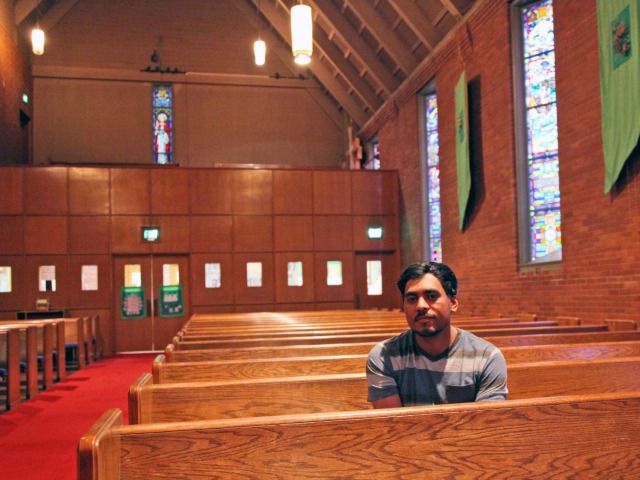
More churches in Arizona are joining the Sanctuary 2014 movement to protect illegal immigrants from deportation.
Eleazar Misael Perez Cabrera’s deportation date was November 16, but he has been shielded from deportation by staying at Shadow Rock Church while his attorney tries to get him a stay from deportation. According to an Arizona Republic report, Cabrera’s story is not unusual. For instance, “in Tucson, Mexican immigrant Rosa Robles Loreto hasn’t left Southside Presbyterian Church since early August,” and “Guatemalan immigrant Luis Lopez-Acabal has lived at the Tempe Church since September.”
As the Republic notes, “Cabrera and Shadow Rock Church are part of a growing movement of activist congregation leaders who believe the United States has violated human rights by deporting millions of immigrants to unsafe countries and separating families,” and the churches have “opened spare rooms, kitchens and bathrooms to immigrants who fear deportation.” These churches provide illegal immigrants with shelter, legal advice, and other churches who want to join the movement are reportedly building showers so they can accommodate illegal immigrants.
The illegal immigrants are generally “safe from deportation as long as they don’t leave the church,” since “Immigration and Customs Enforcement has a policy that discourages agents from conducting arrests at places of worship, schools or hospitals.”
Leaders of the Sanctuary movement have declared that they will play an even more critical role to protect those who do not qualify under Obama’s executive amnesty.
Cabrera reportedly arrived illegally “nine years ago from Guatemala to avoid violence and make money,” and “he has since sent enough money home from his roofing job to build a house for his family, help build a church and launch music recordings for his band.” But since he “has no children,” he is not covered under Obama’s executive amnesty. Cabrera’s brother was reportedly beheaded in Guatemala after he was deported.
Pope Francis’ “U.S. Messenger,” Chicago Archbishop Blase Cupich, recently praised Obama’s executive amnesty and said amnesty legislation is on God’s agenda.
The Sanctuary 2014 movement, in an open letter to the Obama administration, declared that they have a “moral and ethical responsibility” to demand immediate amnesty to everyone who seeks sanctuary in a house of worship:
Dear President Obama, Secretary Johnson and Director Muñoz,
As faith leaders, we write to you regarding our brothers and sisters facing deportation. Our faith traditions share a moral and ethical responsibility to protect and accompany immigrants fighting their deportations and risking everything to keep their families and communities together. We publicly commit to offer or support Sanctuary in our sacred spaces for those lifting their voices to transform our damaging and unjust immigration laws.
We believe that the Sanctuary Movement today reveals the human cost and moral crisis caused by more than 1,000 deportations per day. We call on all people of faith and conscience to share our commitment to protect and accompany immigrants facing racial profiling, workplace discrimination and deportation.
We ask that you immediately grant legally recognized forms of relief, such as a stay of removal or deferred action to all community members currently in Sanctuary. Furthermore, we urge you to immediately expand deferred action in the most accessible and broadest form.
We are also welcoming children and families fleeing violence into the safety of our faith communities as they seek humanitarian protection in the U.S. We ask the Administration to stop fast tracking removal proceedings, which prevents individuals from obtaining necessary legal counsel and preparation for their case. Instead, the Administration should affirm and implement the humanitarian protections in the Trafficking Victims Protection Reauthorization Act and expand funding for access to legal services.

COMMENTS
Please let us know if you're having issues with commenting.